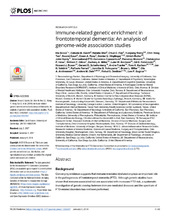| dc.contributor.author | Broce, Iris J. | en_US |
| dc.contributor.author | Karch, Celeste M. | en_US |
| dc.contributor.author | Wen, Natalie | en_US |
| dc.contributor.author | Fan, Chun C. | en_US |
| dc.contributor.author | Wang, Yunpeng | en_US |
| dc.contributor.author | Hong Tan, Chin | en_US |
| dc.contributor.author | Kouri, Naomi | en_US |
| dc.contributor.author | Ross, Owen A. | en_US |
| dc.contributor.author | Höglinger, Günter U. | en_US |
| dc.contributor.author | Müller, Ulrich | en_US |
| dc.contributor.author | Hardy, John | en_US |
| dc.contributor.author | Momeni, Parastoo | en_US |
| dc.contributor.author | Hess, Christopher P. | en_US |
| dc.contributor.author | Dillon, William P. | en_US |
| dc.contributor.author | Miller, Zachary A. | en_US |
| dc.contributor.author | Bonham, Luke W. | en_US |
| dc.contributor.author | Rabinovici, Gil D. | en_US |
| dc.contributor.author | Rosen, Howard J. | en_US |
| dc.contributor.author | Schellenberg, Gerard D. | en_US |
| dc.contributor.author | Franke, Andre | en_US |
| dc.contributor.author | Karlsen, Tom Hemming | en_US |
| dc.contributor.author | Veldink, Jan H. | en_US |
| dc.contributor.author | Ferrari, Raffaele | en_US |
| dc.contributor.author | Yokoyama, Jennifer S. | en_US |
| dc.contributor.author | Miller, Bruce L. | en_US |
| dc.contributor.author | Andreassen, Ole Andreas | en_US |
| dc.contributor.author | Dale, Anders | en_US |
| dc.contributor.author | Desikan, Rahul S. | en_US |
| dc.contributor.author | Sugrue, Leo P. | en_US |
| dc.date.accessioned | 2019-06-18T12:01:20Z | |
| dc.date.available | 2019-06-18T12:01:20Z | |
| dc.date.issued | 2018-01-09 | |
| dc.Published | Broce IJ, Karch CM, Wen, Fan CC, Wang Y, Hong Tan, Kouri N, Ross OA, Höglinger GU, Müller U, Hardy J, Momeni P, Hess CP, Dillon WP, Miller, Bonham LW, Rabinovici GD, Rosen HJ, Schellenberg GD, Franke A, Karlsen HT, Veldink JH, Ferrari R, Yokoyama JS, Miller BL, Andreassen OA, Dale A, Desikan RS, Sugrue LP. Immune-related genetic enrichment in frontotemporal dementia: An analysis of genome-wide association studies.. PLoS Medicine. 2018;15(1):e1002487 | eng |
| dc.identifier.issn | 1549-1277 | |
| dc.identifier.issn | 1549-1676 | |
| dc.identifier.uri | https://hdl.handle.net/1956/20185 | |
| dc.description.abstract | Background: Converging evidence suggests that immune-mediated dysfunction plays an important role in the pathogenesis of frontotemporal dementia (FTD). Although genetic studies have shown that immune-associated loci are associated with increased FTD risk, a systematic investigation of genetic overlap between immune-mediated diseases and the spectrum of FTD-related disorders has not been performed. Methods and findings: Using large genome-wide association studies (GWASs) (total n = 192,886 cases and controls) and recently developed tools to quantify genetic overlap/pleiotropy, we systematically identified single nucleotide polymorphisms (SNPs) jointly associated with FTD-related disorders—namely, FTD, corticobasal degeneration (CBD), progressive supranuclear palsy (PSP), and amyotrophic lateral sclerosis (ALS)—and 1 or more immune-mediated diseases including Crohn disease, ulcerative colitis (UC), rheumatoid arthritis (RA), type 1 diabetes (T1D), celiac disease (CeD), and psoriasis. We found up to 270-fold genetic enrichment between FTD and RA, up to 160-fold genetic enrichment between FTD and UC, up to 180-fold genetic enrichment between FTD and T1D, and up to 175-fold genetic enrichment between FTD and CeD. In contrast, for CBD and PSP, only 1 of the 6 immune-mediated diseases produced genetic enrichment comparable to that seen for FTD, with up to 150-fold genetic enrichment between CBD and CeD and up to 180-fold enrichment between PSP and RA. Further, we found minimal enrichment between ALS and the immune-mediated diseases tested, with the highest levels of enrichment between ALS and RA (up to 20-fold). For FTD, at a conjunction false discovery rate < 0.05 and after excluding SNPs in linkage disequilibrium, we found that 8 of the 15 identified loci mapped to the human leukocyte antigen (HLA) region on Chromosome (Chr) 6. We also found novel candidate FTD susceptibility loci within LRRK2 (leucine rich repeat kinase 2), TBKBP1 (TBK1 binding protein 1), and PGBD5 (piggyBac transposable element derived 5). Functionally, we found that the expression of FTD–immune pleiotropic genes (particularly within the HLA region) is altered in postmortem brain tissue from patients with FTD and is enriched in microglia/macrophages compared to other central nervous system cell types. The main study limitation is that the results represent only clinically diagnosed individuals. Also, given the complex interconnectedness of the HLA region, we were not able to define the specific gene or genes on Chr 6 responsible for our pleiotropic signal. Conclusions: We show immune-mediated genetic enrichment specifically in FTD, particularly within the HLAregion. Our genetic results suggest that for a subset of patients, immune dysfunction may contribute to FTD risk. These findings have potential implications for clinical trials targeting immune dysfunction in patients with FTD. | en_US |
| dc.language.iso | eng | eng |
| dc.publisher | PLOS | eng |
| dc.relation.uri | https://www.ncbi.nlm.nih.gov/pmc/articles/PMC5760014/ | |
| dc.rights | Attribution CC BY | eng |
| dc.rights.uri | http://creativecommons.org/licenses/by/4.0 | eng |
| dc.title | Immune-related genetic enrichment in frontotemporal dementia: An analysis of genome-wide association studies | en_US |
| dc.type | Peer reviewed | |
| dc.type | Journal article | |
| dc.date.updated | 2019-01-30T13:02:01Z | |
| dc.description.version | publishedVersion | en_US |
| dc.rights.holder | Copyright 2018 The Author(s) | |
| dc.identifier.doi | https://doi.org/10.1371/journal.pmed.1002487 | |
| dc.identifier.cristin | 1581764 | |
| dc.source.journal | PLoS Medicine | |
| dc.relation.project | Norges forskningsråd: 223273 | |

